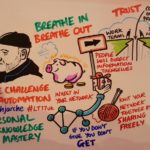About 10 years ago a fictional video, EPIC 2014, forecast the future domination of web media companies like Google and Amazon. The video spread rapidly, with an updated version, EPIC 2015 made as a sequel. The videos describe a future corporation that controls most news on the web; namely Googlezon and its platform called EPIC (Evolving Personalized Information Construct).
EPIC stores and categorizes not only news, but the demographics, political beliefs, and consumption habits of every user. At its best, EPIC is “a summary of the world—deeper, broader and more nuanced than anything ever available before … but at its worst, and for too many, EPIC is merely a collection of trivia, much of it untrue.” EPIC is so popular that it triggers the downfall of the New York Times, which goes offline and becomes “a print newsletter for the elite and the elderly. —Wikipedia
This week, it became public that Hell had indeed frozen over, with Google now selling Facebook advertising. We seem to be moving closer to what is described in EPIC 2014/2015. But diversity of information is necessary for a functioning democracy and I would say just as important for social businesses. In early America, “… news was considered crucial to an informed electorate, the first major postal law, passed in 1792, allowed newspaper printers to send each other newspapers for free, facilitating the spread of national and foreign news outward from the seat of government.” (Universal Service and the Postal Monopoly: A Brief History PDF). Both news and its distribution have changed and today the US Postal Service is under threat of privatization. While newspapers did not guarantee freedom of the press, the emerging power of web media companies makes newspaper barons look like amateurs. With the age of print almost over, it is ironic that we may get even less diversity of news and opinions in the age of networks. Hyperlinks cannot subvert hierarchy, as the Cluetrain claimed, when those hyperlinks are controlled by only a few corporations.
With the consolidation of web media companies, where many, and soon, most of us will be getting our information, it will be increasingly important to build diversity into our own personal and professional learning networks. This may get difficult as more mainstream sites amalgamate their feeds and sources into something similar to Googlezon. Therefore, in this emerging network era, we will need to connect to other people, not centralized information sources, for our own sense-making. Diversity of people in our networks will ensure diversity of thought. This is something that even web media companies cannot control, as long as we maintain control over who we connect to.
Knowledge workers collectively make the relationship capital that creates value in the network era. They need to be not just knowledgeable, but creative as well. How can they do so when information sources are getting more concentrated? Where will the diversity of ideas needed to drive innovation come from?
Knowledge workers need to take control of their networked learning. As corporate Push gets stronger, then social Pull has to counteract it. But there has to be something of quality to pull, and that comes from each and every one of us. We need to build our own knowledge networks; seeking out others, sense-making, and sharing.
 Sense-making, in the growing surround of advertising-sponsored trivia, will become ever more important to maintain democracy and civil society. I think that the principles of PKM can be the foundation for an aggressively intelligent citizenry that manages its own media.
Sense-making, in the growing surround of advertising-sponsored trivia, will become ever more important to maintain democracy and civil society. I think that the principles of PKM can be the foundation for an aggressively intelligent citizenry that manages its own media.
To a great extent PKM [personal knowledge management] is about shifting responsibility for learning and knowledge sharing from a company to individuals and this is the greatest challenge for both sides. —Lilia Efimova 2004
You see, Organizations Don’t Tweet, People Do. Organizations don’t create or manage knowledge either, people do. But people first need the skills and then a cooperative environment to practice these.
The weakness of large-scale knowledge management (KM) as a field is that it is practiced only by a small group of professionals and is controlled by management. It is an enterprise practice. KM is difficult to scale to the masses. PKM, on the other hand, is for everyone.
PKM, in its aggregate and practiced by many, cannot be controlled. It is a technology-neutral framework to promote common understanding through ongoing conversations. PKM is based on mostly manual (mental) practices that are independent from “black-box” technologies like the fictional EPIC 2015. This is PKM’s strength. It is a simple framework that needs experimentation and practice to master, but mostly it requires sharing. Practicing PKM means taking responsibility for knowledge-sharing, one person at a time.
If you are interested in getting an assisted start, see my PKM workshops with an international group of participants. 


Harold,
Great post, as always. One thing I have done to gain more diverse news and views is to feed my curated Twitter lists into Flipboard. Zite is pretty good as well.
However, I’ve found the lost art of conversation to be best fresh news source of all.
Thanks for the insights . . .
Dan Wallace
Well done, Harold.
I’ve never forgotten EPIC.
Yes, PKM is THE basic touchstone. Coupled with critical thinking and an open mind, there’s a chance one won’t go crazy.